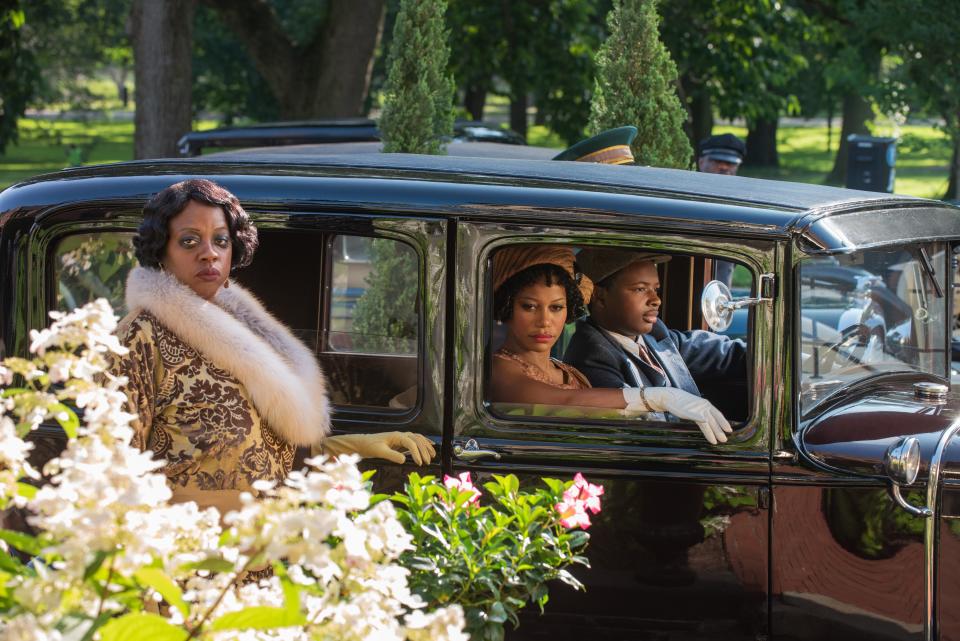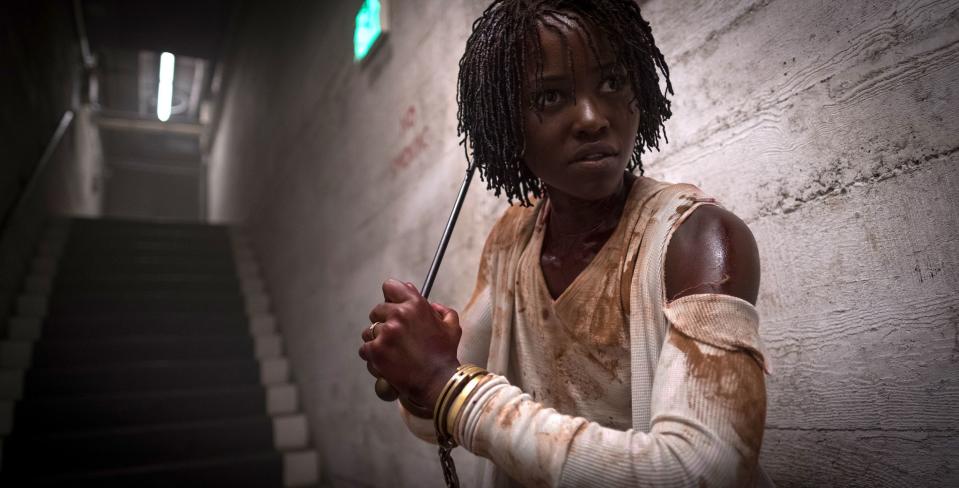What's an Oscar really worth? Career boost is 'not the same' for Black actors, experts say
This month's Academy Awards could be a watershed moment for Black talent.
At the recent Screen Actors Guild Awards, a reliable indicator of future Oscar glory, actors of color won all four acting prizes for the first time ever: best supporting actor Daniel Kaluuya ("Judas and the Black Messiah"), best supporting actress Yuh-jung Youn ("Minari"), best actress Viola Davis and best actor Chadwick Boseman (both "Ma Rainey's Black Bottom").
All have a strong shot at repeating at the Oscars ceremony on Sunday, where Davis could become the first Black woman in history to win two acting Oscars (after supporting actress for "Fences" in 2017), and only the second Black woman to receive the best actress award (after Halle Berry for "Monster's Ball" in 2002).

It marks just the second time ever that the Oscar best actress category has included more than one Black nominee – Davis and Andra Day ("The United States vs. Billie Holiday") – and the first time that best supporting actor has featured three Black contenders: Kaluuya, Lakeith Stanfield ("Judas and the Black Messiah") and Leslie Odom Jr. ("One Night in Miami").
The fact that these milestones haven't been reached before in the show's 93-year history points to a larger problem in Hollywood: about which Black performances are deemed awards-worthy and who reaps the benefits of an Oscar win.
The post-Oscar boost isn't often as immediate for Black actors
Black Oscar winners and nominees like Davis, Denzel Washington and Will Smith have all successfully bounced between awards-friendly dramas, action thrillers, comedies and superhero fare. Regina King used her Oscar bounce for "If Beale Street Could Talk" to direct her first feature, the critically acclaimed "One Night in Miami."
But unlike many of their white peers, these opportunities often took years, if not decades to cultivate.
Jennifer Lawrence was cast in "The Hunger Games" not even two months after earning her first Oscar nomination for 2010's "Winter Bone." Eddie Redmayne ("The Theory of Everything") and Brie Larson ("Room") similarly landed starring roles in the "Fantastic Beasts" and "Captain Marvel" franchises, respectively, less than six months after their first Oscar wins.
Meanwhile, Kenyan-Mexican actress Lupita Nyong'o followed her 2014 Oscar victory for "12 Years a Slave" by playing motion-capture supporting characters in Disney's live-action "The Jungle Book" and the latest "Star Wars" trilogy. Although she made her Broadway debut in 2016's "Eclipsed" and portrayed a key warrior in 2018's "Black Panther," it wasn't until 2019 that Nyong'o headlined a Hollywood film: starring as a mother and her nefarious doppelganger in Jordan Peele's horror-thriller "Us."

"Larson, Lawrence, Redmayne and Nyong'o exhibit the same talent and prowess with acting, yet Nyong'o is the one who seemingly had to wait until 'Us' for a director – and for Hollywood as a whole – to recognize her talent as an actor," says Monique Jones, founder of culture site Just Add Color and author of "The Book of Awesome Black Americans."
"While Nyong'o is highly esteemed in the business by her peers, she still appears in less films than Lawrence, who seemed to be in a glut of films for several years after her first Oscar win," Jones continues. "Lawrence was even given chances to play characters who weren't right for her at all, such as Joy Mangano in 'Joy.'
We should be seeing actresses like Nyong'o in every type of role as well. It's not fair for Hollywood to assume that Black actresses can only be in films about slavery or other types of trauma, or 'Black' family comedies."
Halle Berry has been open about career struggles after Oscar
The dearth of plum roles for Black Oscar winners isn't limited to Nyong'o. "Watchmen" actor Louis Gossett Jr. struggled to find film work coming off his supporting actor victory for 1982's "An Officer and a Gentleman."
"I didn’t work in movies for another year," Gossett told the Television Academy in a 2018 interview. "People weren’t ready for me to win, I guess. Television was ready, ’cause I worked every week in television, but movies took a minute."
Berry similarly told Variety last year that her historic Oscar win wasn't the major step up she thought it'd be.
"I thought, 'Oh, all these great scripts are going to come my way; these great directors are going to be banging on my door.' It didn’t happen," she said. "It actually got a little harder. They call it the Oscar curse. You’re expected to turn in award-worthy performances."
"For her, it probably feels like the Oscar was a method to shut people up about the industry being racist," Jones says. "If it wasn't about that, Berry would have probably gotten some of the roles that go to Hollywood go-to actors such as Meryl Streep. She is just as qualified and capable."
Jennifer Hudson's first role after her 2007 Oscar win for "Dreamgirls" was in 2008's "Sex and the City" movie, as an assistant to Sarah Jessica Parker's Carrie. Gabourey Sidibe ("Precious"), Barkhad Abdi ("Captain Phillips") and Sophie Okonedo ("Hotel Rwanda") have largely had supporting roles in films post-Oscar nods, while three-time nominee Octavia Spencer didn't have top billing on a major studio film until 2019's "Ma" – seven years after her Oscar win for "The Help," playing a maid in the civil rights-era South.
Sidibe's "Precious" co-star Mo'Nique has been vocal about the lack of opportunities since her 2010 supporting actress win. In 2015, the comedian told The Hollywood Reporter that she was "blackballed" and labeled "difficult" for refusing to promote the film when she wasn't compensated fairly.
Davis also spoke out about her struggle for equal pay as a Black actress during a 2018 Women in the World event.
"I think this speaks to the larger mechanism of, how do we value the visibility of African Americans? Are they (considered) viable products in and of themselves?" says Frederick W. Gooding, author of "Black Oscars: From Mammy to Minny, What the Academy Awards Tell Us about African Americans."
Despite the recent successes of films like "Black Panther," "Creed II" and "Straight Outta Compton" internationally, there's still a tired notion in Hollywood that Black-led movies don't sell overseas – a myth that's been busted time and time again by robust box office receipts.
Yet compared with white A-listers like, say Tom Cruise, the career trajectories of minorities are "just not the same," Gooding says. "The bottom line is, the race of the winner ultimately influences their marketability by Hollywood."
So what will it take for an Oscar to become a runway for success?
It starts at the studio level by hiring more Black creatives and executives who can expand the industry's limited definition of what a Black narrative is.
In 1939, Hattie McDaniel became the first Black Oscar winner playing a slave in "Gone with the Wind." Since then, Hollywood has often boxed Black actors into stories about pain and struggle: depicting them as chauffeurs ("Driving Miss Daisy"), criminals ("Hustle & Flow"), and victims of abuse ("The Color Purple"), racism ("Green Book") and poverty ("Beasts of the Southern Wild"). All these films, too, were directed by white filmmakers.
Davis recently expressed frustration with the majority white critics and journalists who cover films, as well as projects with "no understanding" of a Black character's psychology or Blackness.
"I think people are too concerned with the white audience understanding us, and having a way into our stories," Davis told Variety last week. "The reason why our pathology, the study of what makes us tick is not the center of the narrative is that there’s no way in for the white audience. They don’t understand it.”
There have been some strides: Black filmmakers Jordan Peele ("Get Out") and Barry Jenkins ("Moonlight") broke new ground with their singular Oscar-winning films, and two-time acting winner Mahershala Ali will next headline Marvel's "Blade." This awards season had multiple Black stories including "Ma Rainey's Black Bottom," "One Night in Miami" and "Da 5 Bloods" in the conversation, although only "Judas and the Black Messiah" was best picture-nominated. Most of these were also set in the past and saw Black characters fighting being viewed as "lesser than."
By diversifying groups who greenlight projects "to include more women and people of color, you'd see a broader range of stories," says Darnell Hunt, dean of Social Sciences and professor of Sociology and African American Studies at the University of California, Los Angeles.
And with more stories, come more "projects that get us out of the 'great slavery movie,' the civil rights movie or whatever it is that has typically garnered Academy interest."
Contributing: David Oliver, Anika Reed
This article originally appeared on USA TODAY: Oscars: What does a win really mean for Black actors' careers?

